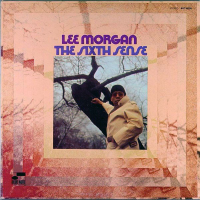Home » Jazz Articles » Album Review » Lee Morgan: The Sixth Sense
Lee Morgan: The Sixth Sense
Remastering with a 24-bit resolution gives the album’s sound an excellent quality. The first six tracks were recorded November 10, 1967 at the Van Gelder Studio in Englewood Cliffs, New Jersey, while the last three come from a September 13, 1968 session. Tenor saxophonist Frank Mitchell and drummer Billy Higgins appear on both recording dates. The first session finds three horns (Morgan, McLean, Mitchell) passing the solo torch from one to another while keeping the mood cool and applying a little tension as directed by the composer. "The Sixth Sense," "Short Count" and "Psychedelic" swing with a bounce that makes them both enjoyable and yet each contains substance. It’s that same personality you hear in much of Horace Silver’s music. Cedar Walton’s "Afreaka" carries a deeper, more dramatic image over a subtle South African beat. Morgan leads a call & response pattern that weighs in with tinges of gospel. Jackie McLean is in fine form; fluid and impressionistic. Similarly, Cal Massey’s "The City of My People" carries a meaningful dirge-like statement; this one about the state of society. Morgan’s muted trumpet moans with echoes of injustice everywhere. The second session includes "Mickey’s Tune," written by Mickey Bass, which also carries a deeper, soulful theme that searches for answers. Morgan’s hard bop quintet runs through two bouncy up-tempo pieces that offer significant solo space for Mitchell. His "Extemporaneous" lights a small fire, but Morgan’s "Leebop" remains rather uninspired; it’s as if Morgan were searching that day for answers that didn’t arrive. Long a model for trumpet tone beauty and inspired hard bop writing, Lee Morgan left behind a legacy that will always bring fresh inspiration.
Track Listing
The Sixth Sense; Short Count; Psychedelic; Afreaka; Anti Climax; The Cry Of My People;
Personnel
Lee Morgan
trumpetLee Morgan- trumpet, Jackie McLean- alto saxophone (tracks 1-6 only) , Frank Mitchell- tenor saxophone, Cedar Walton- piano (tracks 1-6 only), Harold Mabern- piano (tracks 7-9 only), Victor Sproles- bass (tracks 1- 6 only), Mickey Bass- bass (tracks 7-9 only), Billy Higgins- drums
Album information
Title: The Sixth Sense | Year Released: 1969 | Record Label: Blue Note
< Previous
Ron Carter: Brazilian Charm
Next >
Ipsis Quest
Comments
Tags
For the Love of Jazz
 All About Jazz has been a pillar of jazz since 1995, championing it as an art form and, more importantly, supporting the musicians who create it. Our enduring commitment has made "AAJ" one of the most culturally important websites of its kind, read by hundreds of thousands of fans, musicians and industry figures every month.
All About Jazz has been a pillar of jazz since 1995, championing it as an art form and, more importantly, supporting the musicians who create it. Our enduring commitment has made "AAJ" one of the most culturally important websites of its kind, read by hundreds of thousands of fans, musicians and industry figures every month.




















